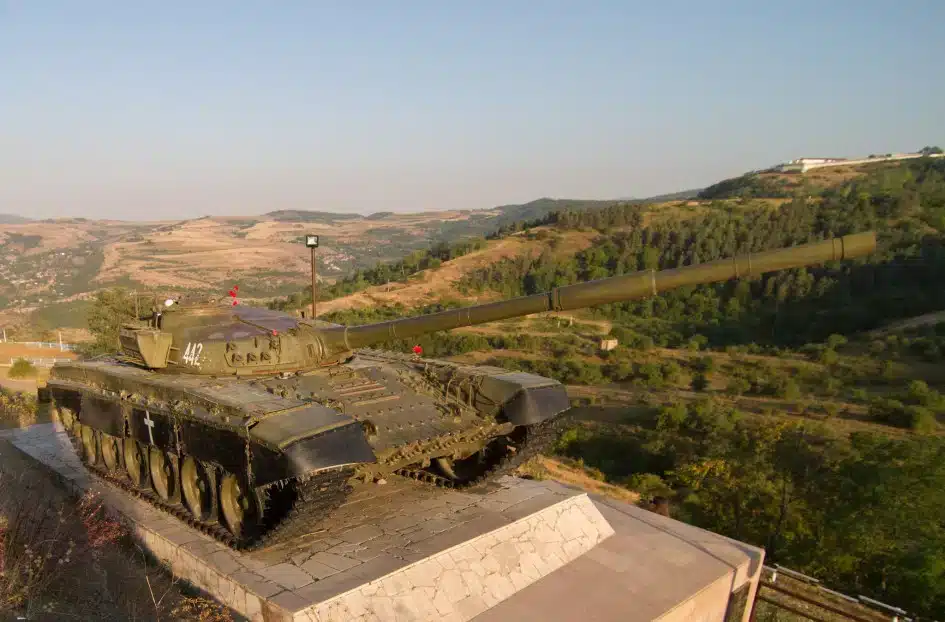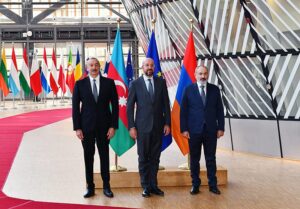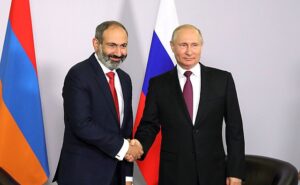Armenia and Azerbaijan find themselves in a persistent stalemate over crucial issues in the peacetalks. Both countries have sent their foreign ministers to Washington in the hopes of resolving their disputes and making progress towards a peace treaty that aligns with their respective interests.
The spokesperson of Armenia states that progress is anticipated but highlighted that disagreements persist on significant matters, despite some areas of agreement. He specified three crucial issues that Armenia considers essential for a peace treaty: establishing a clear map based on mutual recognition of territorial integrity, addressing the rights and security of the people of Nagorno-Karabakh through direct dialogue between Azerbaijan and the Nagorno-Karabakh region facilitated by an international mechanism, and the inclusion of guarantors due to Azerbaijan’s violation of claused of the November 9, 2020 agreement.
Armenia’s demand for special security guarantees for ethnic Armenians in the Nagorno-Karabakh enclave has been rejected by Azerbaijan’s foreign minister ahead of the peace talks and sets the stage for a contentious peace negotiation. Azerbaijan’s Foreign Minister Jeyhun Bayramov states that such guarantees are unnecessary and amount to interference in their internal affairs. He emphasized the Azerbaijan’s constitution and international conventions already safeguard the rights of the population and proposed that ethnic Armenians could maintain their language, culture and education while integrating into Azerbaijani society. Armenian Prime Minister Nikol Pashinyan faces domestic pressure to safeguard the rights of ethnic Armenians, as Baku aims to dissolve Armenian government and military structures and have the population accept Azerbaijani passports.
Tensions have escalated with Baku’s installation of a checkpoint on the Lachin corridor, disrupting the connection between Nagorno-Karabakh and Armenia. Azerbaijan claims the checkpoint is necessary to prevent smuggling of military supplies and illegal materials, while Armenia alleges a blockade that negatively affects the region’s inhabitants.
Agreement looked in sight for a moment
Throughout the history of negotiations between Armenia and Azerbaijan, there have been numerous instances of hopeful expectations for breakthroughs that ultimately faltered before a final agreement could be reached. Recently, there has been an increase in low-level fighting, raising concerns that Azerbaijan may be laying the groundwork for further aggression and ethnic cleansing in the Nagorno-Karabakh region, as highlighted by Armenia’s Ministry of Foreign Affairs in a statement on June 13. Despite the ongoing conflict and diplomatic slowdown, both sides express optimism about the possibility of signing a deal in the coming months. Intensive negotiations and strong international assistance are seen as potential factors of reaching a peace agreement by the end of the year, according to Armen Grigotyan, chair of Armenia’s National Security Council.
The Nagorno-Karabakh enclave, predominantly inhibited by Armenians within Azerbaijan, has long been a source of conflict since the collapse of the Soviet Union in 1991. In 2020, Azerbaijan gained control over previously held Armenian territories, including a significant portion of Nagorno-Karabakh itself. Russian peacekeepers oversee remaining areas, while self-proclaimed local authorities maintain governance. Since then, Azerbaijan has intermittently imposed restrictions on the only access road connecting Nagorno-Karabakh with Armenia.
Blockade remains
Since 15 June, Azerbaijan has been blocking all humanitarian conveys from accessing Nagorno-Karabakh, leaving the population of approximately 120,000 without external assistance. Previously, Russian peacekeepers and the International Committee of the Red Cross (ICRC) were able to bring in limited supplies and transport individuals requiring medical attention. The blockade followed a shootout near an Azerbaijani border post on the Lachin corridor, which connects Nagorno-Karabakh to Armenia. Armenia released a video showing Azerbaijani troops advancing towards Armenia with Russian peacekeepers, raising an Azerbaijani flag before retreating. The conflicting claims between Armenia’s National Security Service and Azerbaijan’s Foreign Ministry highlight the undefined border. Azerbaijan suspended movement along the corridor until Armenia takes responsibility. Nagorno-Karabakh’s de facto state minister urged resource conservation as the population relies on their provisions.
The blockade occurred just as Karabakh residents had begun using the Azerbaijani checkpoint for travel, escorted by Russian peacekeepers. The installation of the checkpoint in late April came after a four-and-a-half month blockade by Azerbaijani government-supported activists. The ICRC confirmed the inability to evacuate Karabakh residents to Armenia for urgent medical care due to the blockade. Essential goods, including food and medication, are in short supply, while the region has experienced a lack of natural gas since 22 March. Electricity blackouts are become more frequent as the local reservoir dries up during the summer.
The importance of reaching a viable agreement cannot be overstated. The Nagorno-Karabakh conflict has been a longstanding source of tensions and suffering for the people in the region. A peaceful resolution would not only bring relief to the affected populations but also foster stability and security in the region. However, the chances of reaching a mutually acceptable agreement between Armenia and Azerbaijan remain challenging and low. The lack of alignment on key issues such as territorial integrity, the rights of the people of Nagorno-Karabakh, and the violation of previous agreements creates significant obstacles to finding common ground. The deep-routed mistrust and historical grievances further complicate the path to a comprehensive peace agreement. Despite the efforts and involvement of international mediators, bridging these gaps and fostering genuine compromise will require substantial political will and a willingness to prioritize the long-term stability and well-being of the region over short-term gains.
Author: Manouk Bronzwaer



